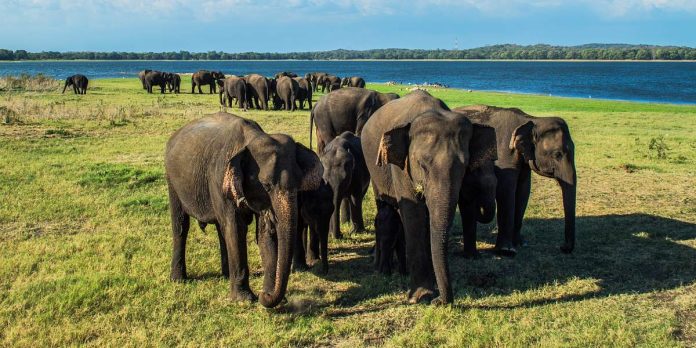The Centre for Environmental Justice (CEJ), a public interest organisation dedicated to environmental conservation, has issued a legal demand to the Department of Wildlife Conservation, urging an immediate halt to unscientific elephant drives carried out as a measure to address human-elephant conflict (HEC).
In the Letter of Demand (LOD) dated 8 January 2025, the CEJ, along with its Chairman Hemantha Withanage, highlighted the ecological, social, and legal implications of such practices, which it claims are causing severe harm to elephants and exacerbating the problem they aim to solve.
This LOD follows recent elephant drives conducted in Anuradhapura, Kurunegala, and Giribawa. One of these drives resulted in about 60 elephants being driven into the Oyamaduwa farm instead of the Wilpattu Reserve as planned by the Department of Wildlife Conservation. The elephants became trapped in the farm, leaving them without adequate access to food and causing starvation.
The CEJ pointed out that the practice of elephant drives—where herds are forcibly relocated—lacks a systematic and scientific approach. This has resulted in far-reaching consequences, including the fragmentation of elephant herds, abandonment of vulnerable individuals such as calves and older elephants, and increased mortality due to starvation, dehydration, and stress. Elephants, being creatures with complex social structures led by matriarchs, rely on cohesion within their herds. Disrupting this dynamic leads to irreversible harm, the organisation said.
The relocation of elephants to unfamiliar territories further deprives them of access to known water sources and foraging grounds. Elephants, which depend on their deep knowledge of their habitat for sustenance, face malnutrition and heightened stress when driven into resource-scarce areas. The CEJ noted that these disruptions undermine elephants’ survival and overall welfare, violating the Department of Wildlife Conservation’s legal obligations under the Fauna and Flora Protection Ordinance No. 2 of 1937 (FFPO).
Another unintended consequence of these drives, according to the CEJ, is the displacement of elephants into new areas that previously experienced minimal or no human-elephant conflict. This migration has led to elephants encroaching on new agricultural and settlement zones, intensifying conflicts in previously unaffected regions and putting additional communities at risk.
The ecological ramifications of these unscientific drives are equally alarming. Elephants, as keystone species, play a critical role in maintaining ecosystems by dispersing seeds and maintaining habitats. The unsystematic relocation of herds disrupts these ecological functions, resulting in long-term biodiversity degradation. The CEJ warned that this undermines the balance of ecosystems essential to Sri Lanka’s environmental heritage.
The LOD further criticised the Department of Wildlife Conservation for failing to align its actions with Sri Lanka’s commitments under international conservation treaties, such as the Convention on Biological Diversity (CBD) and the Convention on International Trade in Endangered Species of Wild Fauna and Flora (CITES). These treaties emphasise sustainable wildlife management and the protection of endangered species, including Asian elephants.
The CEJ demanded that all elephant drives be ceased immediately until a thorough scientific and ecological assessment is conducted to evaluate their impact on elephant populations and human-elephant conflict dynamics. The organisation warned that it would pursue legal action, including public interest litigation, if the Department fails to comply with its statutory obligations and international commitments.
The Asian elephant, designated as a protected species under Sri Lankan law, holds immense cultural and ecological significance. The CEJ stated that the Department of Wildlife Conservation bears both a legal and moral duty to safeguard this iconic species while promoting sustainable coexistence with human communities. It urged the Department to adopt scientifically informed and sustainable wildlife management practices to address human-elephant conflict effectively.




